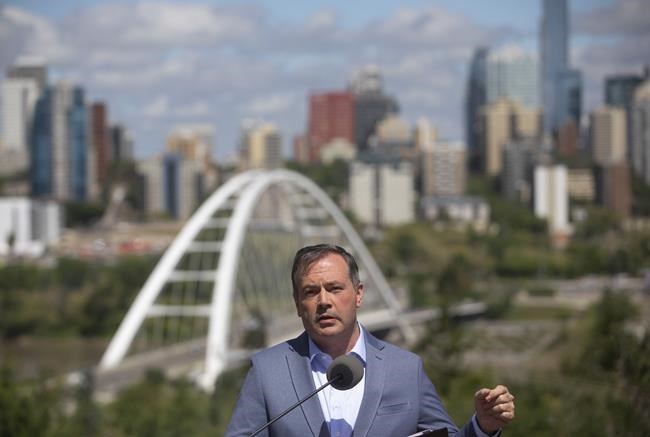EDMONTON — The Alberta government is contributing $8 million in grants to assist First Nations and Métis communities locate the remains and honour the memories of residential schoolchildren.
Premier Jason Kenney says the horror of the schools remains difficult to comprehend.
"The discovery of 215 remains of students at the former Kamloops residential school has shaken our nation and called all of us to reflect on the wickedness of the Indian residential school system," Kenney said Wednesday.
"There have been many of those students who were buried in unmarked graves or graves that have been lost — and we've been reminded we have a moral obligation to find them."
Applications for grants at a maximum $150,000 per group will be taken until the middle of January.
The money can be used for a range of purposes: to search for unmarked graves, to gather information and oral histories about the tragic legacy, or to pay for commemorative work such as grave markers or memorials.
Kenney said it won't be an easy task as archival records are limited or missing, but added: "Alberta’s government is leaving no stone unturned to dig through all our archival records to find whatever we can."
Chief Billy Morin of the Enoch Cree First Nationwest of Edmonton said the money and the recognition are vital steps in coming to terms with a legacy in which Indigenous children were taken from their families, abused and robbed of their culture for decades in residential schools.
"That story never ends. It keeps going. Those open wounds are very much open at this time with Kamloops and things that are going on around the country right now," said Morin.
" (Alberta) is where the most residential schools were, provincially. So (the grant) is a great start. That’s a great action. That's a great reconcili-action."
Aaron Young, chief of the Chiniki First Nation west of Calgary, said the pain of residential schools is intergenerational.
"Our children did experience what our ancestors experienced as well. There's a lot of healing that needs to be done," said Young.
There were 25 federally and church-run residential schools open at various times between 1872 and 1975 in Alberta.
Alberta is the latest province to commit funds to help locate unmarked burial sites at former residential school grounds. This week, Manitoba announced it will commit $2.5 million to the effort. Saskatchewan said last week it will put up $2 million.
The federal government has also dedicated $27 million.
It's part of a growing movement to find the sites after ground-penetrating radar recently detected what are believed to be the remains of 215 Indigenous children at the former Kamloops Indian Residential School site in British Columbia.
This report by The Canadian Press was first published June 23, 2021.
Dean Bennett, The Canadian Press



